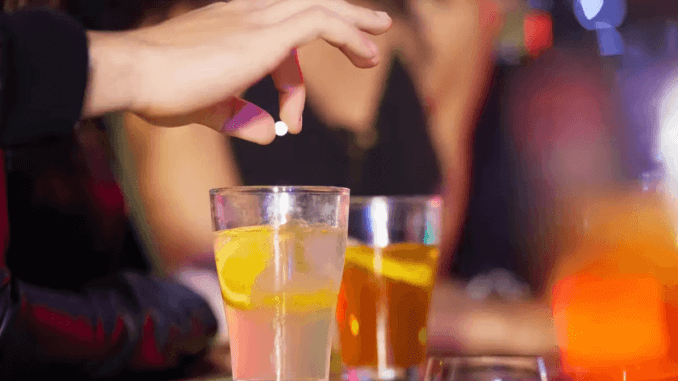
Concerned Edge Hill students will see some of their ideas on how to combat drink spiking, such as a lid to put over the top of a drink, adopted by local police.
Marketing students have worked to create campaigns highlighting the dangers of drink spiking and discouraging potential perpetrators.
According to the Home Affairs Committee, improvements in reporting, investigating and prosecuting spiking incidents are urgently needed, to improve support for victims and to act as a deterrent.
CI Chris Abbott, DC Jonathan Piearce-Swift, and DS Diane Higham visited campus to hear students’ ideas, along with Dave Mutch from Ormskirk Street Pastors whose trained volunteers from local churches offer reassurance, safety and support.
Students proposed social media and poster campaigns focused on deterring people from spiking drinks in the first place. They have spoken to bars in Ormskirk to gauge interest in promoting safe drinking and encouraging measures to prevent spiking. Other potential initiatives included a reusable straw which would glow when coming into contact with a drink that has been spiked.
One group suggested an app that would automatically track someone’s location on a night out, making it easier to retrace their steps in the event that their drink has been spiked, and another looked at a virtual reality video where students could use a headset to experience first-hand the symptoms of having their drink spiked.
Dr. Susie Marriott, a senior lecturer in the Business School, said:
“Drink spiking is an important issue for students and society as a whole.
“Our fantastic students came up with some brilliant ideas to tackle drink spiking and everyone was really impressed with some of the innovative initiatives they put forward.
“Thanks to local police for agreeing to work with our students on this project.”
DS Diane Higham from the local Vulnerability and Investigation unit added:
“This is a great opportunity for us to work first-hand with students, on what is an important issue around student safety.
“They get to design and create material which is relevant to young people. We’re delighted that Edge Hill University is committed to tackling this to make their campus’ a safe place to study, but also making students aware of how to stay safe when they are out and about.
“We are looking forward to working with the University to roll this out in time for Fresher’s Week later in the year.”
Because it is hard to detect in taste, smell, or sight, the first sign that your drink may have been spiked is a change in how you feel. This could include: feeling nauseous; vomiting; loss of balance; unconsciousness; visual problems; and lower inhibitions.
The UK Government’s Home Affairs Committee led an inquiry into drink spiking and published its findings last month.
Limited reporting, a victim-blaming culture and a lack of capacity for forensic testing were all identified as barriers to reporting.
The Government is considering the case for a separate criminal offence for spiking, and the Home Office has been asked to commission research to feed into a national strategy for prevention, detection and prosecution of spiking.

Be the first to comment